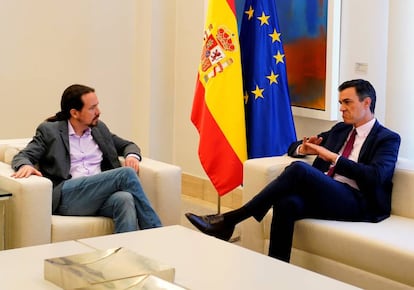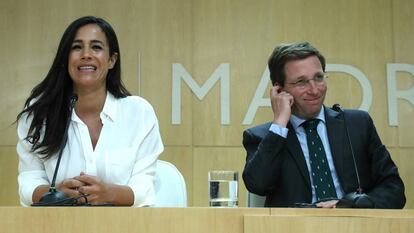In Spain, parties argue over the meaning of “cooperation government”
Acting PM Pedro Sánchez and Podemos leader Pablo Iglesias have hit a stumbling block in their slow-moving negotiations to reach a deal ahead of an investiture vote

Now that Spain’s new mayors have been appointed, something is moving again in national politics. Nearly two months after a general election that gave a victory to the Socialist Party (PSOE) but delivered a fractured parliament, acting Prime Minister Pedro Sánchez has begun working in earnest toward a deal that will allow him to form a government.
Podemos wants a third of Cabinet positions, reflecting its own weight in Congress compared to the PSOE
Sánchez met on Monday with Pablo Iglesias, head of the anti-austerity Podemos party, to discuss the exact nature of the “government of cooperation” that both leaders recently announced. This meeting, first reported by eldiario.es, did not go well, according to sources familiar with the situation.
The main stumbling block is the fact that Iglesias wants Cabinet positions that will reflect his party’s weight relative to the PSOE in parliament (42 seats versus 123), whereas Sánchez has rejected this idea.
Instead, the PSOE leader, who originally wanted to lead a minority government with support from the Unidas Podemos group, is now willing to offer Iglesias mid-level government positions, but not ministerial portfolios.
Additionally, Sánchez is offering to make Podemos his party’s preferential partner and for both groups to sign a joint program ahead of his own investiture bid in Congress.
Iglesias has said very clearly that he will accept nothing short of ministerial posts for his party
Last week, both parties announced that they had agreed on a “government of cooperation” to replace the coalition government initially sought by Podemos, which came in fourth at the April 28 election after the PSOE, the Popular Party (66 seats) and Ciudadanos (57 seats).
The announcement was meant to kickstart negotiations that had been on hold while Spaniards voted again on May 26 at local and regional elections. Those votes yielded equally splintered councils and assemblies, sending parties into a race to forge governing alliances. In Madrid, a deal between the PP, Ciudadanos and the far-right Vox pushed out the leftist mayor, Manuela Carmena, and in Barcelona the Socialists and Ciudadanos’ Manuel Valls, a former prime minister of France, teamed up to support the incumbent, Ada Colau, over Ernest Maragall of the separatist Catalan Republican Party (ERC).
Coalition vs cooperation
For Iglesias, a coalition government and a cooperation government are essentially the same: a joint executive where Podemos would hold a third of the Cabinet positions, reflecting its own weight relative to the PSOE inside Congress: 42 to 123. But for Sánchez, it means making Podemos its priority partner for key decisions, drafting an investiture deal that would influence the political agenda throughout Sánchez’s term in office, and offering Podemos mid-level positions in his administration.
So far, Iglesias has said very clearly that he will accept nothing short of ministerial posts for his party. In the meantime, the PSOE is pressuring the PP and Ciudadanos to at least abstain at the investiture vote where Sánchez will seek to be officially appointed as the prime minister of Spain. There is no date yet for this vote, although Socialist sources are talking about the first or second week of July.
If Sánchez were to fail in his bid to form a government, and no other successful candidate stepped up, Spaniards would be facing a fresh general election – the fourth since December 2015, when a similar scenario unfolded, forcing the country into a repeat election in June 2016.
The Vox problem

Vox, which earned seats across Spain at local and regional elections on May 26, is demanding proportional representation in governments in exchange for its support. This poses a problem for the PP and Ciudadanos, who need the hard-right party’s support in key cities and regions but claim they will not let it have any governing power.
“There will not be any government departments for Vox, there cannot be,” said Ciudadanos’ Begoña Villacís, the new deputy mayor of Madrid. “The coalition government is between the PP and Ciudadanos. That’s the way the agreement was signed.”
The PP, however, this week admitted that Vox could be getting at the very least "concejalías delegadas," which Villacís says are not government positions proper, but "part of the political or administrative administration."
English version by Susana Urra.
Tu suscripción se está usando en otro dispositivo
¿Quieres añadir otro usuario a tu suscripción?
Si continúas leyendo en este dispositivo, no se podrá leer en el otro.
FlechaTu suscripción se está usando en otro dispositivo y solo puedes acceder a EL PAÍS desde un dispositivo a la vez.
Si quieres compartir tu cuenta, cambia tu suscripción a la modalidad Premium, así podrás añadir otro usuario. Cada uno accederá con su propia cuenta de email, lo que os permitirá personalizar vuestra experiencia en EL PAÍS.
¿Tienes una suscripción de empresa? Accede aquí para contratar más cuentas.
En el caso de no saber quién está usando tu cuenta, te recomendamos cambiar tu contraseña aquí.
Si decides continuar compartiendo tu cuenta, este mensaje se mostrará en tu dispositivo y en el de la otra persona que está usando tu cuenta de forma indefinida, afectando a tu experiencia de lectura. Puedes consultar aquí los términos y condiciones de la suscripción digital.








































